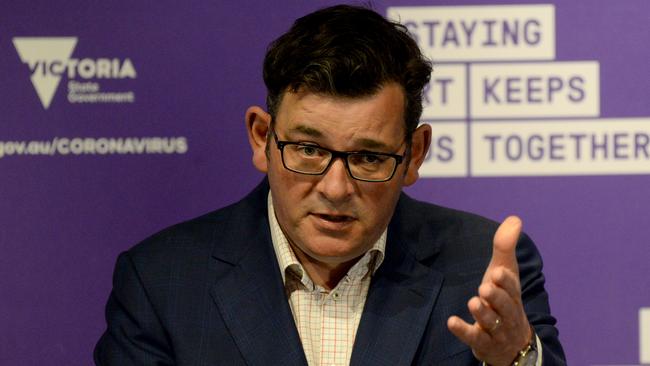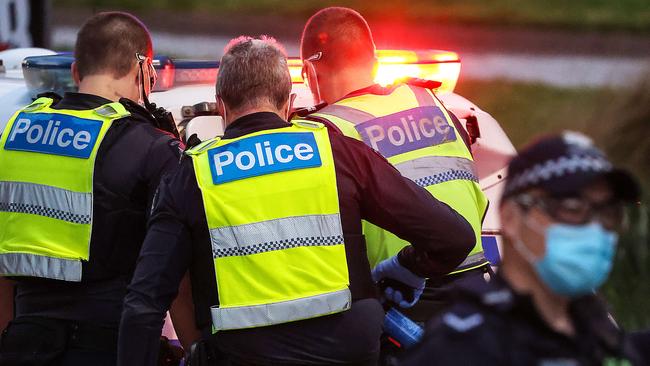Edward O’Donohue: Daniel Andrews uses COVID crisis to ramp up secrecy
Premier Daniel Andrews continues to sidestep transparency and install a veil of secrecy over the actions of his office and government. But his behaviour hasn’t gone unnoticed, writes Edward O’Donohue.

Opinion
Don't miss out on the headlines from Opinion. Followed categories will be added to My News.
While Daniel Andrews is now back-pedalling from some of the more extreme components of the contentious COVID-19 Omnibus (Emergency Measures) and Other Acts Amendment Bill 2020, which was passed by the Victorian parliament’s Lower House, it remains deeply troubling.
This is not just the view of the Opposition. A group of senior, eminent and highly respected judges and barristers in an open letter previously described the Bill as “unprecedented, excessive and open to abuse”.
With the Bill rushed through the Lower House of parliament so quickly, giving “authorised officers” unprecedented power to pre-emptively detain fellow Victorians, the simple question of why these extraordinary powers, more usually associated with a dictatorship, were ever proposed, remains unanswered.
This Bill, together with the hotel quarantine debacle and the harsh restrictions that continue to
dominate our lives, has engaged thousands of Victorians who previously saw politics as an
irrelevance.
This has now changed, and I’ve been contacted by thousands of concerned Victorians expressing outrage, surprise and alarm at Daniel Andrews’ behaviour.

While this behaviour has been a shock to many, the Bill is just the latest step by Andrews to centralise power, sidestep parliament and abandon many of the checks and balances that protect our liberty and freedom.
After the election in November 2014, Daniel Andrews immediately centralised decision making, to the point where his private office has had more advisers than that of the Prime Minister. It’s no surprise that all roads in the hotel quarantine debacle lead to the Premier’s private office and his department.
Andrews has installed a veil of secrecy over the actions of his office and more generally, across government.
Freedom of information requests have become more difficult and VCAT, where FOI appeals are heard, remains underfunded, thereby delaying unwanted scrutiny of his decisions.
Investigation of alleged misconduct by ministers and the bureaucracy has also been made harder with the chronic under-resourcing of both the Independent Anti-Corruption Commission and the Victorian Ombudsman. Both agencies were recently forced to take the unusual step of publicly calling for additional funding.
It’s often said, “don’t waste a crisis” and when it comes to ramping-up secrecy and centralisation, Andrews has taken his power to the next level.
Traditional cabinet government has been sidestepped with the “gang of eight” COVID cabinet effectively running Victoria with input from a very small number of public servants, many now reporting directly to the Premier, rather than the responsible minister.
The Lower House of parliament was effectively shut from mid-June until early September, only brought back so that Andrews could ram through a six-month extension to his state of emergency powers and lower the threshold needed to invoke those powers.
Victoria has experienced a state of emergency and a state of disaster concurrently for the first time in its history, giving Andrews more power than any of his predecessors.
Andrews has refused to allow a committee of the parliament with a non-government majority to be established to oversee his government’s COVID response, despite ballooning debt and the precedents established in the Australian, New South Wales and New Zealand parliaments.
The $6 million COVID-19 Hotel Quarantine Inquiry has failed to get answers to the central questions, such as who made the decision to use security guards rather than police or the Australian Defence Force.
Perhaps this is the way Daniel Andrews designed it, with narrow terms of reference, a short
reporting time frame and powers that are inferior to a royal commission.
Finally, the amnesia, blame shifting and other unedifying performances at the inquiry of senior
officials and ministers would make Sir Humphrey blush.
The “I don’t remember” or “I don’t recall” defence has again been highlighted by Monday’s
humiliating resignation of Daniel Andrews’ right-hand man, Chris Eccles, the most senior public servant in Victoria.
Mr Eccles’ belated resignation follows an examination of his personal phone records that revealed he made a two-minute phone call to former police chief, Graham Ashton, during the critical “missing six-minute” period between 1.16pm and 1.22pm on March 27 this year.
This latest revelation, coupled with the submission last week by former health minister, Jenny
Mikakos, casts doubt over the veracity of the evidence provided to the inquiry by Andrews and those closest to him which must be further tested until we have the truth.
As others have noted, Daniel Andrews is very different to previous Labor premiers such as John Cain, who had a deep respect and appreciation for our democracy and its institutions. Andrews shows little respect for such values in his desire to concentrate power and decision making.
The engagement of so many Victorians in recent months shows that unlike Andrews, they respect the democratic institutions that underpin our freedom and prosperity; a lesson for the next Premier.
Edward O’Donohue is Shadow Attorney-General
